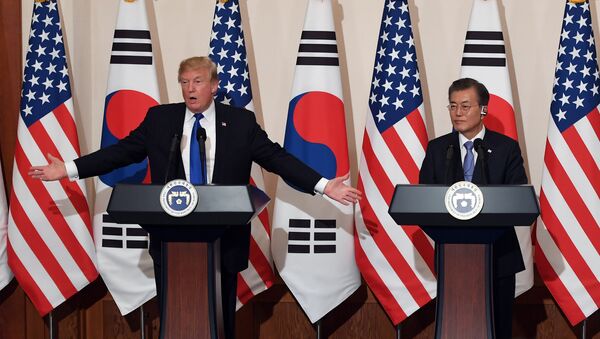"I am certain that President Trump’s occasional aggressive statements are just another means to pressure North Korea and that he does not intend to take those military actions. In some way, the US and South Korea are taking on an appropriate division of roles," South Korean President Moon Jae-in said in an interview, aired by the Channel NewsAsia broadcaster on Thursday.
He has reiterated the allies’ commitment to the full denuclearization of North Korea.
"And to achieve this goal we are operating very closely, we need to put high pressure and sanctions to ultimately bring North Korea to the negotiations table," Moon said.
The situation on the Korean Peninsula has extremely escalated due to Pyongyang's repeated missile launches and a nuclear test, as well as an exchange of threats between Washington and Pyongyang, with US President Donald Trump threatening to resort a "devastating" military option and "totally destroy" North Korea if forced to defend itself or its allies, and North Korean leader Kim Jong-un warning Washington of the highest level of hard-line countermeasures in history, including a plot to strike the US territory of Guam.
On Joint South Korea-US Drills
According to the president, South Korea and the United States cannot discuss the halt of joint military drills proposed by Russia and China as part of the so-called "double freeze" plan, according to which North Korea should simultaneously stop nuclear tests, due to the escalation of tensions on the Peninsula.
"South Korea and China have the same stance that the denuclearization and resolution of the North’s nuclear problem should be done through peaceful means … But at this time when the tensions of the North’s nuclear and missile threats are heightening, I believe we cannot discuss halting South Korea-US joint military exercises," Moon said.
The South Korean president has stressed that North Korea should halt its nuclear and missile programs first, before the international community would take corresponding measures.
On Japan's Military Expension
When speaking about Japan's potential attempts to strengthen the country’s armed forces and increase its military presence in the region, Moon said that the Association of Southeast Asian Nations (ASEAN), alongside with South Korea, would oppose such actions.
"If Japan takes the path to military expansion in the name of North Korea’s nuclear weapons, ASEAN nations, together with South Korea, would not welcome it," Moon said.
Moon added that he doubted whether it was necessary to develop cooperation between the United States, Japan and South Korea into a trilateral military alliance.
The government aspires to amend Japan's constitution, chiefly the ninth article prohibiting the Japanese military from operating abroad. Constitutional changes require support of a two-thirds majority in the lower and upper houses of Japan's parliament, which was secured by the ruling coalition in the latest election to the lower house in late October. During the election campaign, Abe has repeatedly cited North Korean nuclear and missile threat as main reasons for constitutional amendments.



